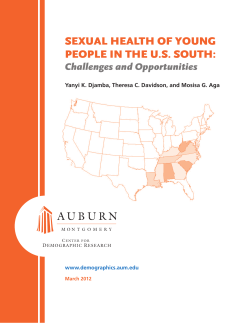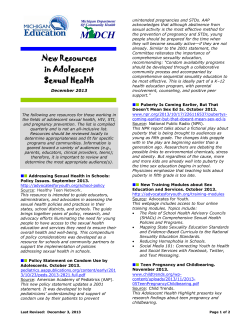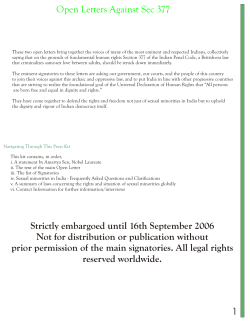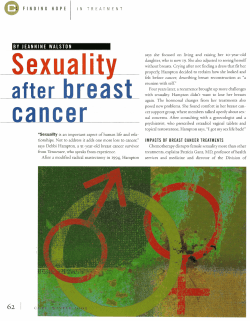
ENTERTAINMENT INDUSTRY A New Era: Understanding the Legal Rights of Homosexual Players
Westlaw Journal ENTERTAINMENT INDUSTRY Litigation News and Analysis • Legislation • Regulation • Expert Commentary Expert Analysis VOLUME 25, ISSUE 8 / OCTOBER 2013 A New Era: Understanding the Legal Rights of Homosexual Players In Professional Sports Scott James Preston, Esq., and Michael Gregg, Esq. Littler Mendelson PC In a March 14 letter to NFL Commissioner Roger Goodell, New York Attorney General Eric Schneiderman inquired why during the 2013 NFL scouting combine, several college football players were allegedly asked about their sexual orientation. The players attending the weeklong event to perform in front of scouts, coaches and general managers in advance of the NFL draft were not current NFL players when the inquiries were made, nor had they been drafted. Nevertheless, these prospective players, as well as others, are protected by state, local and federal employment statutes and, arguably, their respective collective bargaining agreements. THE COLLECTIVE BARGAINING AGREEMENTS Whether the National Football League CBA protects undrafted, unsigned players from sexual orientation discrimination depends upon whether they have “commenced negotiations” with a particular team. Article 49 of the NFL CBA expressly prohibits discrimination based on sexual orientation, but that prohibition only applies to a “player” — a term that is undefined in the CBA. The NFL’s CBA’s preamble, however, states that the NFLPA is “recognized as the sole and exclusive bargaining representative of present and future employee players” including: “(3) All rookie players once they are selected in the current year’s NFL college draft; and (4) All undrafted rookie players once they commence negotiation with an NFL Club concerning employment as a player.” The phrase “commencing negotiations” is not defined in the CBA. In July Major League Baseball announced its “Workplace Code of Conduct: Sexual Orientation,” which makes clear that MLB “considers all employees, applicants, players and prospective players without regard to … sexual orientation or other status protected by law.” Like the NFL CBA, however, the MLB CBA only expressly prohibits discrimination on the basis of sexual orientation of current “players.” Article II of the WESTLAW JOURNAL ENTERTAINMENT INDUSTRY CBA, however, arguably expands coverage to prospective players by stating that the MLBPA is the “sole and exclusive collective bargaining agent for all Major League Players, and individuals who may become Major League Players during the term of this agreement, with regard to all terms and conditions of employment.” Section 5 of the National Basketball Association CBA prohibits discrimination against “any player because of … sexual orientation.” Again, the term “player” is not defined under the general definitions of the NBA CBA. Thus, while discrimination against a current NBA player such as Jason Collins would clearly be prohibited, the issue is less clear with respect to prospective NBA players that have not yet signed with a team. Whether the National Football League CBA protects undrafted, unsigned players from sexual orientation discrimination depends upon whether they have “commenced negotiations” with a particular team. Finally, Article 7 of the National Hockey League CBA prohibits discrimination because of sexual orientation, among other categories. Unlike the other major sports, however, the term “player” is defined in the NHL CBA to mean “a hockey player who is party to [a standard player’s contract], a rookie, unsigned draft choices and free agents.” The NHL CBA also “recognizes the NHLPA as the exclusive bargaining representative of all present and future players employed as such in the League by the clubs.” LOCAL, STATE AND FEDERAL LAW Irrespective of whether future players are covered by the CBAs discussed above, prospective players may be covered by state and federal employment discrimination laws because independent statutory rights are not preempted by the Labor Management Relations Act. Title VII of the Civil Rights Act of 1964, as amended, makes it unlawful to “fail or refuse to hire or to discharge any individual, or otherwise to discriminate against any individual with respect to his compensation, terms, conditions, or privileges of employment, because of such individual’s race, color, religion, sex, or national origin.” Historically, courts held that discrimination based on “sexual orientation” was not protected by Title VII. In 1989, however, the U.S. Supreme Court held in Price Waterhouse v. Hopkins, 490 U.S. 228 (1989) that an employer violates Title VII’s prohibition against discrimination based on sex if it discriminates against an employee for not conforming to socially constructed gender expectations. Thus, although the statutory language of Title VII does not expressly prohibit discrimination based on “sexual orientation,” a number of federal court decisions suggest that discrimination based on “sex” may include “sexual orientation” given the broad interpretation outlined by the U.S. Supreme Court in Hopkins. Players and teams may also be potentially liable for sexual harassment under Title VII of the Civil Rights Act of 1994, as amended. While “shoptalk” and “general unpleasantness” in the workplace typically does not rise to the level of sexual harassment, there is no clear dividing line between such “shoptalk” and actionable harassment. In Doe v. City of Belleville, 119 F.3d 563 (7th Cir. 1997), for example, the 7th U.S. Circuit Court of Appeals found there was sufficient evidence to warrant a trial on a claim for sexual harassment where the plaintiffs were constantly having their gender questioned, were subjected to homophobic epithets such as “queer” and “fag” and were urged to “go back to San Francisco.” The 7th Circuit made clear the claim would not be defeated simply because the harasser was the same gender or was not sexually attracted to the victim. Id. at 575. Furthermore, under rapidly expanding third-party harassment claims, several courts have found that employees who merely witness sexual harassment or report sexual 2 ©2011 Thomson Reuters VOLUME 25 • ISSUE 8 • OCTOBER 2013 harassment may also be able to assert a hostile work environment or retaliation claim under Title VII. In addition to federal law, 22 states (including California), along with myriad municipal codes, expressly prohibit discrimination based on sexual orientation. These state and local laws would protect prospective players from sexual orientation discrimination even if a federal court determined that Title VII does not. WHAT ACTION SHOULD TEAMS TAKE TO MITIGATE RISK AND PREVENT DISCRIMINATION? While the CBAs of the four major sports organizations prohibit sexual orientation discrimination, it is unclear whether the CBAs apply to prospective players or whether the organizations are legally allowed to do so under traditional labor law principles. Accordingly, teams should not rely solely on an applicable CBA to address sexual orientation discrimination. As noted above, in light of the Supreme Court’s expansive definition of discrimination based on sex and expanding state and municipal ordinances prohibiting sexual orientation discrimination, teams may consider implementing discrimination policies that protect prospective players. In addition to making clear that discrimination based on sexual orientation is strictly prohibited, policies should: • Include prohibitions on slurs, insults, jokes, unwelcome physical conduct and sharing pornography by any medium. • Establish reporting channels and strictly prohibit retaliation for reporting misconduct. • Establish that the policy extends beyond the locker room or training facility but also to other team-related events such as social gatherings, practice or recruiting. Most importantly, well-drafted policies only go so far. Teams must also provide training for coaches and executives on these policies and legal requirements. Effective training should address real life examples of discriminatory conduct such as inappropriate text messaging, email transmissions or other methods of communication, as well as workplace banter and other remarks that are often considered harmless but may nevertheless be legally actionable. WJ Scott James Preston (L) is a shareholder in the Indianapolis office of Littler Mendelson PC, the world’s largest employment and labor law firm representing management. He has extensive experience representing universities and other employers on a variety of workplace issues, employment disputes, and compliance with federal, state and local laws. He can be reached at (317) 287-3534 or spreston@littler.com. Michael Gregg (R) is a shareholder in the firm’s Orange County office. He represents employers in all aspects of labor and employment law and provides training to professional sports organizations on labor and employment issues. He can be reached at (949) 705-3002 or mgregg@ littler.com. ©2011 Thomson Reuters ©2013 Thomson Reuters. This publication was created to provide you with accurate and authoritative information concerning the subject matter covered, however it may not necessarily have been prepared by persons licensed to practice law in a particular jurisdiction. The publisher is not engaged in rendering legal or other professional advice, and this publication is not a substitute for the advice of an attorney. If you require legal or other expert advice, you should seek the services of a competent attorney or other professional. For subscription information, please visit www.West.Thomson.com. 3
© Copyright 2025





















